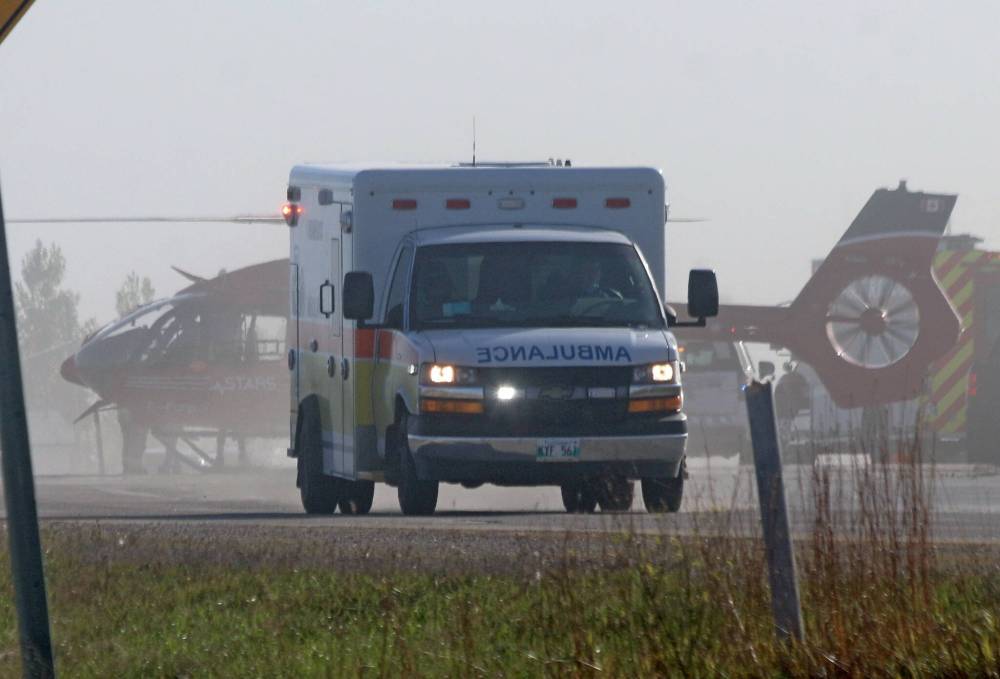Union applauds change to advanced paramedic responsibilities
Advertisement
Read this article for free:
or
Already have an account? Log in here »
To continue reading, please subscribe:
Monthly Digital Subscription
$0 for the first 4 weeks*
- Enjoy unlimited reading on winnipegfreepress.com
- Read the E-Edition, our digital replica newspaper
- Access News Break, our award-winning app
- Play interactive puzzles
*No charge for 4 weeks then price increases to the regular rate of $19.00 plus GST every four weeks. Offer available to new and qualified returning subscribers only. Cancel any time.
Monthly Digital Subscription
$4.75/week*
- Enjoy unlimited reading on winnipegfreepress.com
- Read the E-Edition, our digital replica newspaper
- Access News Break, our award-winning app
- Play interactive puzzles
*Billed as $19 plus GST every four weeks. Cancel any time.
To continue reading, please subscribe:
Add Free Press access to your Brandon Sun subscription for only an additional
$1 for the first 4 weeks*
*Your next subscription payment will increase by $1.00 and you will be charged $16.99 plus GST for four weeks. After four weeks, your payment will increase to $23.99 plus GST every four weeks.
Read unlimited articles for free today:
or
Already have an account? Log in here »
Hey there, time traveller!
This article was published 09/04/2025 (232 days ago), so information in it may no longer be current.
Manitoba is ending the longstanding practice of excluding highly trained paramedics from using their full range of expertise in rural and northern regions.
Shared Health has not hired paramedics who obtain the highest possible level of training in their profession — an advanced care paramedic or ACP designation — to work at that level since its inception.
Fourteen ACPs have been tapped to work as “clinical service leaders” in seven communities located outside major urban centres, Health Minister Uzoma Asagwara announced on Wednesday.

Shared Health’s first cohort of advanced care paramedics is being stationed in Lac du Bonnet, Portage la Prairie, Ashern, Neepawa, Dauphin, Swan River and Flin Flon. (Supplied)
Asagwara told reporters the previous PC government did not hire or train ACPs in rural and northern communities and never provided rationale for its approach.
“Advanced care paramedics can provide really acute, dynamic care in communities. They can be on an ambulance or they can be more mobile than that and go and meet people in their own homes,” the minister said, adding that expanding the scope of paramedicine in the province has been among their top priorities since the 2023 election.
The new hires have a mandate to provide in-depth and life-saving care, including but not limited to performing medical interventions, on a scene upon arrival. Their skills are akin to those who staff emergency rooms, and they will not be responsible for transporting patients via rapid-response vehicles.
The Manitoba Association of Health Care Professionals applauded the announcement, although its leader said he is uncertain why it has taken so long to create these positions.
“Many Shared Health paramedics completed their ACP training years ago, at significant personal cost in time and money. They have been extremely frustrated by the lack of opportunity to utilize their advanced skills, or to be recognized and paid as ACPs,” union leader Jason Linklater said.
Shared Health’s first cohort of ACPs is being stationed in Lac du Bonnet, Portage la Prairie, Ashern, Neepawa, Dauphin, Swan River and Flin Flon.
The additions “address the need for a higher level of emergency pre-hospital care in rural Manitoba” and staff member interest in advancing their careers, a spokesperson for the provincial health authority said in a statement.
Communications specialist Jason Permanand noted that work has been underway to set up a system to support ACPs that ensures clinical competency can be maintained and there are ongoing education and quality assurance programs.
In a news release, Scott Noble, executive director of emergency medical services operations, said ACPs will make Shared Health’s emergency response system “more nimble and responsive.”
The NDP government’s 2024-25 budget set a target of hiring 90 paramedics. There was a net gain of 14 paramedics.
Its financial plan for 2025-26 sets aside funding for 16 new paramedic training seats.
maggie.macintosh@freepress.mb.ca

Maggie Macintosh
Education reporter
Maggie Macintosh reports on education for the Free Press. Originally from Hamilton, Ont., she first reported for the Free Press in 2017. Read more about Maggie.
Funding for the Free Press education reporter comes from the Government of Canada through the Local Journalism Initiative.
Every piece of reporting Maggie produces is reviewed by an editing team before it is posted online or published in print — part of the Free Press‘s tradition, since 1872, of producing reliable independent journalism. Read more about Free Press’s history and mandate, and learn how our newsroom operates.
Our newsroom depends on a growing audience of readers to power our journalism. If you are not a paid reader, please consider becoming a subscriber.
Our newsroom depends on its audience of readers to power our journalism. Thank you for your support.

